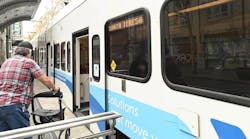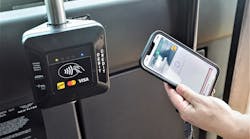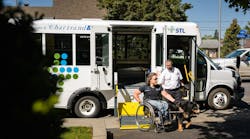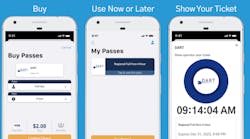Fare technology updates: King County Metro and Sound Transit, SolTrans, Société de transport de Laval
King County Metro Transit and Sound Transit, along with Solano County Transit (SolTrans) and the Société de transport de Laval (STL) have made improvements to their fare collection strategies to improve the customer experience.
King County Metro Transit/Sound Transit
King County Metro Transit and Sound Transit riders are now able to save and access ORCA transit cards in Google Wallet from Android and Wear OS devices, enabling customers to pay for transit, fund their accounts, purchase a pass, view transactions and see trip history all within the Google Wallet app.
“We’re excited for this feature to offer another convenient payment option for transit customers using Google devices,” said Brittany Esdaile, director of the ORCA program.
Customers who own plastic ORCA cards can easily convert them into digital cards on Google Wallet at no extra charge. If customers have an Android phone, converting their plastic card to a digital card is available for Adult, Youth, Senior, Disabled and ORCA LIFT cards. Upon conversion, the plastic card will be deactivated and all passes and balances will be seamlessly transferred to the phone. New Adult digital cards added to the wallet will cost the same as purchasing a plastic ORCA card.
ORCA notes businesses, schools and organizations that issue ORCA cards will determine if they enable the cards that they provide to be added to Google Wallet.
To use ORCA from Google Wallet, customers must have an Android phone and have their ORCA card loaded into the Google Wallet app. Customers can also connect a Wear OS device to Google Wallet. The feature is only available for ORCA cards at this time; customers cannot use credit and debit cards from Google Wallet to pay for transit in the Puget Sound Area.
SolTrans
On July 1, SolTrans will eliminate paper passes as a fare payment option on all Local Routes and Express Lines. Paper passes will continue to be accepted on paratransit buses. The change is part of the agency’s broader strategy to modernize public transportation in Solano County, Calif., and ensure a smoother, more efficient ride for all passengers.
SolTrans already offers several digital fare payment methods to ensure a seamless transition for its riders:
- Token Transit: A user-friendly mobile app allowing riders to purchase and activate passes directly from their smartphones.
- Clipper Card: A versatile contactless smart card that supports both cash value and various passes. The Clipper Card is the all-in-one transit card used for contactless fare payments throughout the San Francisco, Calif., Bay Area.
- Clipper START Card: A means-based fare program offering eligible riders a 50 percent discount.
For those who prefer traditional payment methods, SolTrans will continue to accept exact cash and coins for purchasing one-way fares and day passes onboard all local and express buses.
In November 2023, the SolTrans Board approved the initiative to go paperless. Starting in January 2024, SolTrans staff began extensive outreach efforts to inform and assist riders with the transition, including hosting events at the Vallejo Transit Center, where staff provided hands-on assistance and information about the new digital fare options.
All SolTrans paper passes expire and are not refundable or exchangeable. Current passes expire June 30, 2024, and will no longer be valid for travel after the expiration date.
STL
The STL has seen success with its debit card payment method for bus fares since its launch in 2023.
The agency notes that since the debit card payment method was launched in spring 2023, nearly 625,000 trips have been paid for by debit card, representing a daily average of 2,400 trips on weekdays and 1,300 trips on weekends. In May 2024, the payment method experienced its highest month of usage, with 65,344 trips paid by debit card. To date, the debit card represents 30 percent of unit payments.
The agency notes a debit card payment requires a pre-authorization of C$18.75 (US$13.70) from customer’s bank accounts. The payment will appear on riders’ bank statement the same day, then disappear the next morning.
Paratransit customers can also pay for their trips aboard the vehicles reserved for them with a debit or credit card. The pilot project was launched in 2023 and is continuing thanks to the collaboration of COOP Taxi Laval and Chartrand Inc.

Brandon Lewis | Associate Editor
Brandon Lewis is a recent graduate of Kent State University with a bachelor’s degree in journalism. Lewis is a former freelance editorial assistant at Vehicle Service Pros in Endeavor Business Media’s Vehicle Repair Group. Lewis brings his knowledge of web managing, copyediting and SEO practices to Mass Transit Magazine as an associate editor. He is also a co-host of the Infrastructure Technology Podcast.






